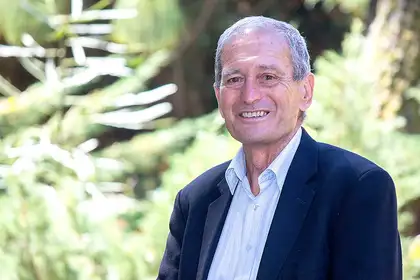
Emeritus Professor Sir Mason Durie.
On the brink of his 80th birthday and after an honours-studded career, Emeritus Professor Sir Mason Durie will receive a further accolade when he is bestowed with an honorary doctorate by Massey University.
Sir Mason, Rangitāne, Ngāti Kauwhata, Ngāti Raukawa, whose name is both synonymous with Massey and the field of Māori health, will be presented with his doctorate in Health at graduation ceremonies in Palmerston North tomorrow.
Four days later he turns 80, a milestone from which he can reflect back on a career dedicated to the pursuit of innovations in health and the prevention of illness culminating in him being the instigator of Massey’s College of Health, which opened five years ago.
He was also a key member of the College of Humanities and Social Sciences team and helped to establish of Te Pūmanawa Hauora, the Māori Health Research Centre, in 1993 and the School of Māori Studies, Te Pūtahi-a-Toi in 1988. He was head of the school for 14 years before being appointed as Massey’s first assistant Vice-Chancellor (Māori). In late 2002 that role expanded to include Pasifika and then new migrants in 2009.
Among his many successes in fostering Māori-focused health education, research and training, in 1999 he also facilitated a partnership with the Ministry of Health to establish, Te Rau Puawai, which continues to provide up to 100 scholarships a year for students studying health-related subjects.
He is still involved with an associate programme, Te Rau Matatini, as an adviser and is an appointee to the Government Inquiry into Mental Health and Addiction, which reported back earlier this week.
Key to dealing with growing community concern around the issue of mental health has been changing the focus on hospital treatment to focus on community leadership.
The move away from over-reliance on hospitals is a welcome change from a century ago when New Zealand had among the most psychiatric hospital beds per capita in the western world. The ensuing disestablishment of the mental health division in the 1970s and the focus toward community mental health care was a welcome development but the next step will be an even sharper focus on wellness, he says.
“You can’t have wellness if you have social and economic inequalities such as poverty educational failure and unemployment. In that respect achieving optimal standards of health and wellbeing cannot be left to the health sector alone.”
His own health journey began as a high-school student at Te Aute College, Hawke’s Bay, where he was inspired to study medicine after hearing the stories about former pupils and early Māori health leaders such as Sir Maui Pomare and Sir Peter Buck.
After Dr Henry Bennett, Sir Mason became only New Zealand’s second Māori psychiatrist. Sir Mason cites the late Eru Pomare (Sir Maui’s grandson), David Yates and Paratene Ngata as other colleagues and mentors who have inspired him over the years. He also names his predecessor as head of Māori Studies at Massey, Sir Hugh Kawharu, and former Massey Vice-Chancellor Sir Neil Waters as major influences too.
College of Humanities and Social Sciences Pro Vice-Chancellor Distinguished Professor Paul Spoonley, who put forward the honorary doctorate nomination, says that Sir Mason belongs among the two generations of “ground-breaking” Māori in modern New Zealand. One generation emerged early in the 1900s and included the aforementioned Sir Maui, Sir Peter as well as Sir Apirana Ngata, and the other at the end of the 20th century, where he stands alongside leaders such as Dr Ranginui Walker, Sir Robert Mahuta and Sir Tipene O’Regan, “… but of all the latter, Sir Mason’s influence was the most comprehensive and powerful” Professor Spoonley says.
Last year Sir Mason was awarded the Blake Medal, the premium award for leadership in New Zealand.
His leadership of Māori Studies at Massey was described by Professor Spoonley as “pre-eminent” in contributing to new research on Māori. “For example, Te Hoe Nuku Roa was a longitudinal study of Māori families that set a new benchmark in understanding Māori life chances and experiences. It was ground breaking research by Sir Mason. He was to do this repeatedly,” Professor Spoonley says.
Sir Mason says there has definitely been a growing awareness and interest among New Zealanders in learning te reo and recognising the potential of indigenous cultures to enrich modern societies.
“With the Māori Land March and Te Reo petition in the 1960s and 1970s there has been a progressive development that is now reflected in higher Māori participation in university education and the recognition of matauranga Māori (Māori knowledge) and Māori culture as valuable contributions to higher education and research.
“It’s a far cry from when I was growing up and you only had ten minutes of Māori news on the radio at 6pm on Sundays. This year has taken it to a new level and the Te Reo Māori Act (2016) has helped.
“We are reaping the benefit of this and have become something of a showcase for other indigenous languages struggling to retain their [own] language.”
Sir Mason’s determination to develop the aspirations of Māori students eventually led to a tenfold increase in those completing doctorates over a ten-year period.
“What we did was lift expectations with a deliberate attempt to focus on postgraduate education. We tried to encourage a vision that went beyond bachelor’s degrees so that postgrad education could become the norm. And the number of Masters degrees began to increase as did the number of Māori PhDs.”
His connection to Massey has been a family affair too, with his wife Lady Arohia, a former Professor of Māori Education at the University, while his son Dr Meihana Durie is the current head of the Māori Studies unit.
Family and colleagues all deserved a share of his latest honour, Sir Mason says. “The accolades are deserved by a wide group including colleagues, students, those working on marae and within their communities over a long period of time.”